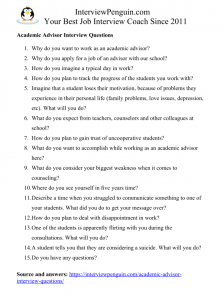Academic Advisors help students to choose the right courses, progress in their studies, and eventually graduate with best possible grades and knowledge. They typically work in higher education (colleges and universities), but a high school may also employ an academic advisor
This interesting role allows for a satisfying career in education, without a need to earn a Master’s Degree, or have years of experience under your belt. Let’s have a look at some questions you may face while interviewing for the job.
Table of Contents
Why do you want to work as an academic advisor?
The key is to convince them that you see a meaningful purpose in your role, that you do not apply only because you can’t get any better role in education.
You can explain a pivotal role an academic advisor played in your education (they helped you to make the right career choice, guided you while you struggled to overcome a crisis of motivation, gave you words of encouragement when you needed it badly, etc).
Another option is referring to your excellent listening and interpersonal skills, and your understanding for the problems students experience, in both their academic and private life. Such a skill set makes from you a perfect candidate for the job, and you decided to apply. You want to do a good job as an advisor, and you have what it takes to achieve your goal.
If you have a relevant experience, you can also refer to it in your answer.
Why do you apply for a job of an advisor with our school?
You should do your research and find something positive about your future place of work. Perhaps they run interesting study programs, or counseling plays a truly important role in student’s life, and isn’t just of secondary importance (which is still a case at many colleges).
You can also opt for a more prosaic reason, such as good location of the school (easy traffic connection, nearby your apartment), good reputation in the local community, anything.
Research can help you a lot in your interview, since it is much easier to connect with the hiring committee once you know something about their school and students.
How do you imagine a typical day in work?
This is one of the jobs in education in which you can comfortably hide in your office all day long, doing almost nothing. But interviewers should not get an impression that such is your plan.
Most students won’t seek your guidance, won’t approach you, won’t knock on your door. It’s just not how it works. You have to take the initiative, and the interviewers should get an impression that you want to take it.
For example, you can say that you will make a list of students, and try to consult each one at least once a year, at the beginning of the school year. You will ask them about their goals, future plans (the job they would like to have), or you will help them to find their path while asking targeted questions, or letting them to fill questionnaires.
You will also explain each student how you can help them–not only with course scheduling; and you will basically try to build a good connection with them. Initial meetings will help you identify students who are most likely to need your help, and work with hem further down the road.
Messaging the teachers at the beginning of each week, asking whether some students experience behavioral or performance issues (and need your counseling) is another way of making the first step.
You can talk also about specific duties, such as paperwork, creating reports on students’ progress, aiding in course selection, etc. The most important thing, however, is to show initiative and proactive approach to your work.
How do you plan to track the progress of the students you work with?
We always need a goal (or a set of goals and milestones) to be able to track any progress. You can say that you will try to outline a basic plan for each student, including courses they want to take, grades they would like to achieve, and so on.
Comparing the plan with their actual academic results is the easiest way to monitor their progress. However, life is not black and white, numbers do not tell the entire story, and plans do change.
That’s why it is important to have regular meetings with your students, updating the plans, trying to identify problems early, and helping them to address them (or referring them to school counselors, psychologists, and other professionals, if you cannot help them within the scope of your responsibilities).
Imagine that a student loses their motivation, because of problems they experience in their personal life (family problems, love issues, depression, etc). What will you do?
This is a tricky question. You are neither a mental health counselor nor a psychologist. You should not do something that is outside of the scope of your responsibilities.
Certainly you can say that you will try to encourage the student, to help them rediscover the meaning of their education. But at the end you should refer them to school counselor or psychologist, to your colleagues who specialize in such situations like helping students deal with depression or with family issues.
Show the interviewers that you clearly understand your position in the school system, and that you want to cooperate with your colleagues, counselors and psychologists, while trying to achieve the best possible outcome for each student.
Special Tip: Download the full list of questions in a one page long PDF, and practice your interview answers anytime later:

What do you expect from teachers, counselors and other colleagues at school?
I’d say you have two options for a good answer. First one is saying that you expect a lot from one person only–from yourself. You want to do an excellent job, and do not hope that someone else will take care of your duties.
Surely, you understand that teamwork is important, and you hope to have a good cooperation with teachers and administrators. But you do not plan to think much about their job, and whether they could do something better.
Second option is saying that you expect an honest and open communication. You are aware that your job is interrelated with the jobs of many other professionals, and that once communication and feedback flows freely in all directions, you can achieve the best possible results with each student.
You can add several practical examples. For example, you hope teachers will let you know as soon as they notice that a student starts falling behind (so you can try to address the issue before it grows into something bigger), or that you will have regular meetings with counselors/psychologists to discuss the progress of each problematic students, and the next steps you should take while trying to help them graduate.
How do you plan to gain trust of uncooperative students?
Some students will keep their mouth shut once they enter your office. You will ask questions and they will give no answers (or will give answers with no meaning).
It is difficult to gain trust of such students. You can suggest explaining, in a friendly way, that you are there to help them, that their words won’t leave your office, and explaining how exactly you can help them. Repetitive meetings, and written questionnaires (maybe they do not want to talk, but will write) can also help you to get some information.
If your options fail, however, you will refer them to school psychologist. Ensure the interviewers that you do not expect to succeed with everyone. That’s just how it goes in this profession, and it won’t discourage you to keep trying with the rest of the students…
Other questions you may get in your academic advisor interview
- What do you want to accomplish while working as an academic advisor here?
- What do you consider your biggest weakness when it comes to counseling?
- Where do you see yourself in five years time?
- Tell us about an obstacle you overcame.
- Describe a time when you struggled to communicate something to one of your students. What did you do to get your message over?
- How do you plan to deal with disappointment in work?
- One of the students is apparently flirting with you during the consultations. What will you do?
- Describe a situation when you demonstrated leadership at work.
- A student tells you that they are considering a suicide. What will you do?
- Tell us about a time when you successfully used persuasion to convince someone.
- Why shouldn’t we hire you?
Conclusion, great answers to all scenario-based questions
Interview for a position of an academic advisor belongs to job interviews with average difficulty in the field teaching and education administration. This job title isn’t particularly popular, and you typically won’t compete with many other candidates for the job–which makes your situation easier.
You may get some tricky situational questions, but if you do a good research about your future place of work, and prepare for the questions in advance, you should make it and sign a new job contract at the end of your interviews.
If you want to make sure that you won’t catch you unprepared, however, or simply streamline your interview preparation, have a look at our Interview Success Package. Up to 10 premium answers to 31 most common scenario-based interview questions (+ more ) will help you get ready for every challenge you may face in this interview, and walk away with a new employment contract. Thank you for checking it out, and I wish you best of luck in your interview!
Glen
May also interest you:
- School counselor interview questions – some questions overlap with the questions for advisors.
- Student Assistant interview questions.
- Academic Coach interview questions.


